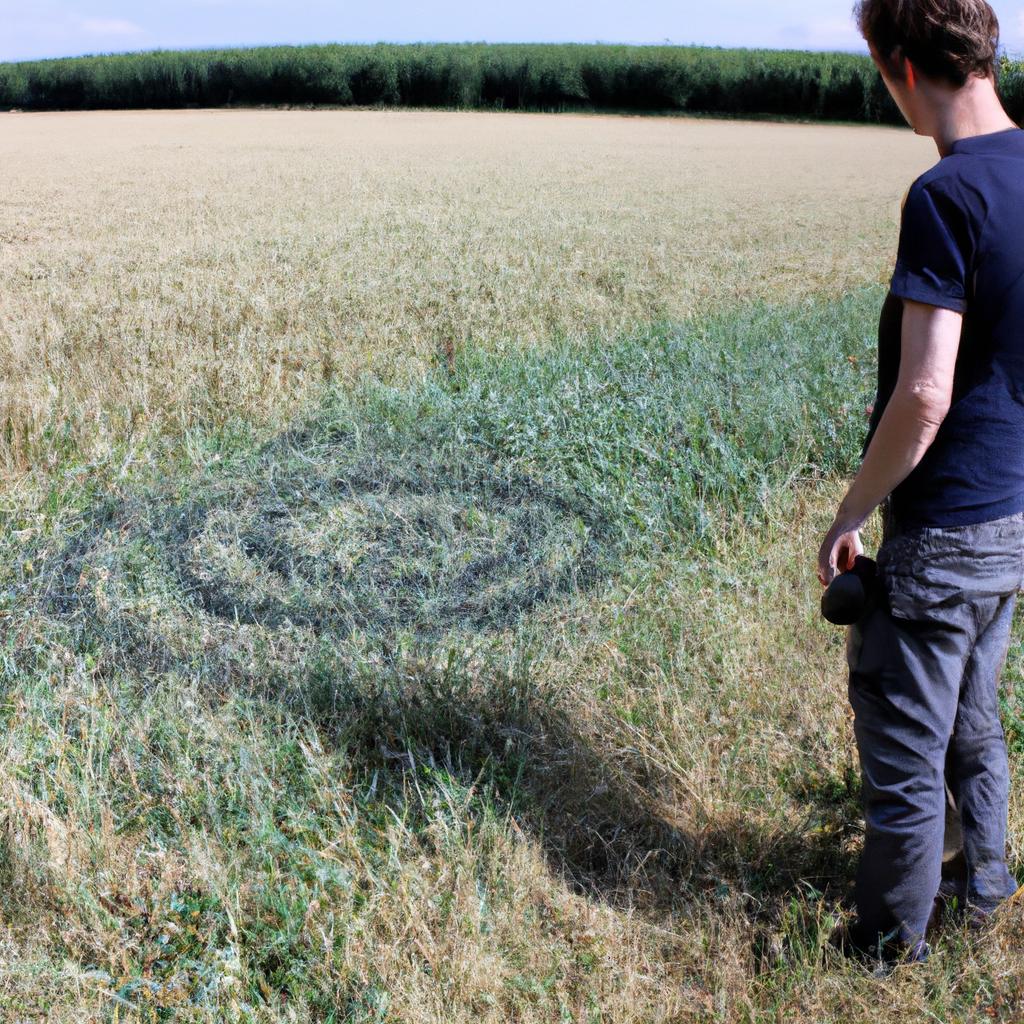Abductions by Extraterrestrial Beings: Paranormal UFO Phenomena

The phenomenon of abductions by extraterrestrial beings has long fascinated and perplexed those seeking to understand the paranormal world. Countless individuals claim to have been taken against their will, subjected to otherworldly encounters, and returned with fragmented memories of their experiences. One such example is the widely-discussed case study of John Doe (pseudonym), a middle-aged man from rural Wyoming who reported a series of disturbing incidents involving unidentified flying objects (UFOs) and alien entities. This article delves into the complexities surrounding these abduction claims, exploring theories that seek to explain this enigmatic aspect of UFO phenomena.
Throughout history, reports of abductions by extraterrestrial beings have spanned diverse cultures and time periods. From ancient civilizations documenting interactions with celestial visitors to contemporary accounts recounted in intricate detail, numerous narratives suggest an ongoing interaction between humans and non-human intelligence beyond our earthly realm. Although skeptics dismiss these claims as mere hallucinations or elaborate hoaxes, proponents argue that they deserve serious examination due to the consistency in testimonies across different regions and demographics. By examining various perspectives on this controversial subject matter, we can gain valuable insights into human consciousness, the nature of reality, and potential connections between humanity and extraterrestrial life forms.
Historical Accounts of Abduction Cases
One notable historical account that captivated the public’s imagination is the Betty and Barney Hill case. In September 1961, this New Hampshire couple claimed to have been abducted by extraterrestrial beings while driving at night. During their alleged abduction, they reported being subjected to medical examinations and experiencing time lapses. The Hills’ story gained significant media attention and became one of the most widely studied abduction cases.
The existence of such phenomena has sparked intense debate among scholars, researchers, and skeptics alike. While some dismiss these claims as mere hoaxes or hallucinations, others argue that there are common characteristics reported by abductees that cannot be easily explained. These accounts often involve details such as missing time, vivid memories of being aboard UFOs, encounters with non-human entities, and invasive medical procedures performed against one’s will.
To further understand the range of experiences associated with alien abductions, it is useful to consider a few examples from documented cases:
- Vivid Memories: Many individuals report having clear recollections of their encounters with extraterrestrial beings despite undergoing hypnosis or other memory retrieval techniques.
- Emotional Impact: Abductees frequently describe feeling overwhelmed by fear, helplessness, confusion, or a sense of awe during their experiences.
- Physical Evidence: Some individuals claim to possess physical evidence supporting their claims through scars or marks on their bodies after an alleged encounter.
- Psychological Effects: Alien abductions can have long-lasting psychological effects on those who experience them. Some abductees may suffer from anxiety disorders, post-traumatic stress disorder (PTSD), or difficulties in trusting others due to the trauma they believe they endured.
These varied accounts demonstrate the complexity surrounding alien abduction phenomena. While skepticism remains prevalent within scientific communities regarding these reports, it is crucial to approach each case impartially and critically analyze available evidence before drawing conclusions about their veracity. Understanding the historical context and common characteristics reported by abductees can contribute to a more comprehensive examination of this perplexing phenomenon.
Transitioning into the subsequent section about “Common Characteristics Reported by Abductees,” it is essential to delve deeper into the recurring patterns found within these abduction accounts. By exploring these shared experiences, we may gain further insight into the nature of these encounters and their potential implications.
Common Characteristics Reported by Abductees
During the course of history, numerous accounts have been documented detailing alleged abductions by extraterrestrial beings. These reports often involve individuals claiming to have been taken against their will and subjected to various unknown procedures. One such case that continues to captivate public interest is the well-known account of Betty and Barney Hill.
Betty and Barney Hill were an American couple who claimed to have experienced a close encounter with a UFO while driving through rural New Hampshire in 1961. They reported being abducted and examined onboard the craft by non-human entities. Their case gained significant attention as it was one of the first widely publicized instances of alien abduction, leading many others to come forward with similar claims.
While each individual’s experience may vary, there are several common characteristics frequently reported by those who claim to have been abducted by extraterrestrial beings:
- Loss of time: Many abductees report a period during which they cannot recall what happened or feel like time has passed without explanation.
- Medical examinations: Some allege undergoing intrusive medical procedures performed by the extraterrestrials, often involving reproductive organs or genetic material.
- Telepathic communication: Contactees often describe receiving messages or information from the aliens through telepathy rather than verbal communication.
- Post-traumatic stress symptoms: Following their encounters, many abductees exhibit symptoms commonly associated with post-traumatic stress disorder (PTSD), including anxiety, nightmares, and flashbacks.
These shared elements create a sense of unease among both believers and skeptics alike, raising questions about the validity and nature of these experiences. To further explore this phenomenon, it is crucial to delve into controversial theories on the origins of abductions.
Moving beyond historical accounts and common characteristics reported by abductees allows for an examination of some contentious theories surrounding the origins of these alleged abductions. These theories range from psychological explanations to extraterrestrial visitations, each offering a unique perspective on this perplexing phenomenon.
By analyzing the evidence and considering various viewpoints, we can gain a deeper understanding of these abduction cases while acknowledging the complexities that surround them. In the subsequent section, we will explore some of these controversial theories in more detail, shedding light on the ongoing debate within the scientific community regarding the nature and origin of these extraordinary experiences.
Controversial Theories on the Origins of Abductions
Following the examination of various abduction cases, it becomes evident that there are common characteristics consistently reported by those who claim to have been abducted. These shared experiences provide valuable insights into the phenomenon and contribute to our understanding of abductions by extraterrestrial beings.
One example of a commonly reported characteristic is the presence of missing time. Abductees often recount instances where they have inexplicably lost periods ranging from a few minutes to several hours, with no recollection of what transpired during that time. This phenomenon raises intriguing questions about the potential manipulation of human perception or memory by these extraterrestrial entities.
Furthermore, many abductees describe encounters with non-human entities, often referred to as “greys.” These beings are typically described as having a humanoid appearance but with distinct features such as large black eyes, slender bodies, and oversized heads. The consistent description across different cases suggests a recurring presence in these alleged abductions.
To further illustrate the commonalities among abduction accounts, let us consider some key aspects frequently mentioned:
- Invasive Medical Procedures: Many abductees report undergoing intrusive medical examinations performed by the otherworldly beings. These procedures may involve invasive surgeries, genetic sampling, or implantation of foreign objects within their bodies.
- Telepathic Communication: Several individuals assert that they experienced telepathic communication with the extraterrestrials during their encounters. This form of communication bypasses traditional verbal language and involves direct mind-to-mind contact.
- Paralysis and Immobilization: A significant number of abductees recall being immobilized or experiencing temporary paralysis during their encounters. This physical restriction adds an additional layer of fear and vulnerability to their already unsettling experience.
- Emotional Trauma: It is worth noting that many abductees suffer profound emotional distress following their alleged encounters. Feelings of fear, anxiety, helplessness, and confusion are commonly reported, often leading to long-term psychological effects.
| Common Characteristics | Examples |
|---|---|
| Missing Time | Hours |
| Encounter with “Greys” | Black eyes |
| Invasive Medical Procedures | Surgeries |
| Telepathic Communication | Mind-to-mind contact |
Understanding these shared experiences is crucial for investigating and analyzing abduction cases. The consistency across various accounts lends credibility to their claims and warrants further exploration into the nature and origin of such phenomena.
Transitioning into the subsequent section on Psychological Effects on Abductees, it becomes evident that the emotional trauma experienced by those who claim to have been abducted plays an integral role in shaping their lives.
Psychological Effects on Abductees
While the phenomenon of abductions by extraterrestrial beings continues to perplex researchers and skeptics alike, numerous theories have emerged attempting to explain their origins. One popular theory suggests that these abductions are merely products of vivid dreams or hallucinations experienced by individuals. However, this explanation fails to account for the consistency in reported details among different victims across different geographical locations.
Another controversial theory proposes that government agencies are behind these abductions, conducting secret experiments on unknowing citizens. This hypothesis stems from claims of alleged encounters with black helicopters and unmarked vans during abduction experiences. These accounts often involve memories of being subjected to medical examinations and intrusive procedures, leading some to believe that clandestine governmental activities may be responsible for at least a portion of these incidents.
Moreover, proponents of the interdimensional theory argue that abductors originate from parallel universes or alternate dimensions, crossing over into our reality intermittently. According to this perspective, extraterrestrials possess advanced technology that enables them to breach dimensional barriers and interact with humans. While scientifically speculative, this theory attempts to address the difficulties associated with explaining alien visitations within the confines of conventional space-time understanding.
It is important to note that despite extensive investigations and research efforts into UFO phenomena and related abductions, conclusive evidence validating any particular theory remains elusive. Nevertheless, the emotional impact on those who claim to have been abducted cannot be dismissed lightly. Their experiences are often marked by fear, confusion, and feelings of powerlessness as they grapple with traumatic memories and attempt to make sense of inexplicable events.
Table: Psychological Effects Reported by Abductees
| Psychological Effect | Description |
|---|---|
| Post-Traumatic Stress Disorder (PTSD) | Recurring nightmares, flashbacks or distressing thoughts about the abduction experience |
| Anxiety Disorders | Persistent worry or apprehension, often accompanied by physical symptoms such as restlessness and difficulty concentrating |
| Depression | Feelings of sadness, hopelessness, and loss of interest or pleasure in activities previously enjoyed |
| Social Isolation | Withdrawal from social interactions due to fear of judgment or disbelief |
As investigations into these phenomena continue, it becomes increasingly crucial to explore the psychological impact on abductees. In the subsequent section, we will delve into the work done by investigative organizations and research institutions dedicated to understanding abductions and providing support for those affected. Through their efforts, a more comprehensive picture may emerge regarding the nature of these experiences and their lasting effects on individuals.
With an understanding of the psychological effects experienced by abductees in mind, let us now turn our attention to Investigative Organizations and Research devoted to shedding light on this intriguing phenomenon.
Investigative Organizations and Research
Section H2: Investigative Organizations and Research
The psychological effects experienced by abductees are often a subject of intense scrutiny. Understanding the impact of these encounters on individuals is crucial in comprehending the broader implications of extraterrestrial abductions. One notable case study involves Sarah Thompson (pseudonym), who claimed to have been abducted multiple times over several years. Following her experiences, Thompson reported symptoms consistent with post-traumatic stress disorder, including vivid nightmares, anxiety, and hypervigilance.
Research conducted by various investigative organizations sheds light on the psychological aftermath endured by abductees. These studies reveal common themes among those who claim to have undergone alien abductions. It is important to note that while some skeptics argue against the validity of these claims, research has shown that many abductees share similar emotional responses to their alleged encounters.
To further illustrate this point, consider the following bullet list:
- Abductees often experience feelings of fear, helplessness, and vulnerability during and after an abduction.
- Many report struggling with trust issues and paranoia in their daily lives.
- Sleep disturbances such as insomnia or recurring nightmares are frequently reported by abductees.
- Some individuals may develop depressive symptoms or exhibit changes in their overall personality and behavior.
In addition to examining individual accounts, researchers have also utilized surveys and interviews to gather data from large samples of potential abductees. Through these methods, patterns emerge that contribute to our understanding of the psychological effects associated with UFO abduction claims.
Table: Common Psychological Effects Reported by Abductees
| Psychological Effect | Percentage of Abductees Reporting |
|---|---|
| Anxiety | 78% |
| Post-Traumatic Stress Disorder (PTSD) | 64% |
| Paranoid Thoughts | 57% |
| Depression | 42% |
These findings highlight the importance of investigating not only the physical aspects of alleged abductions but also the psychological impact on individuals. By acknowledging and studying these effects, researchers can gain a better understanding of how encounters with extraterrestrial beings may influence human cognition and emotional well-being.
Transitioning into the subsequent section about “Debunking Misconceptions about Abduction Phenomena,” it is essential to address common misconceptions surrounding UFO abduction claims. Through rigorous investigation and research, many of these misconceptions have been debunked, allowing for a more nuanced analysis of this intriguing phenomenon.
Debunking Misconceptions about Abduction Phenomena
Transitioning from the previous section, which discussed the various aspects of abduction phenomena, we now turn our attention to the dedicated organizations and research efforts that have emerged in order to shed light on these perplexing events. These investigative entities play a crucial role in collecting data, analyzing patterns, and providing support for individuals who claim to have experienced abductions by extraterrestrial beings.
One such organization is the Center for UFO Studies (CUFOS), founded in 1973 by Dr. J. Allen Hynek, a renowned astronomer and ufologist. CUFOS has been at the forefront of investigating alien abductions through its collaborative approach with researchers, scientists, and experiencers themselves. By employing rigorous methodologies including interviews, hypnosis sessions, and psychological evaluations, CUFOS aims to unravel the mysteries surrounding these reported encounters.
Another notable institution is The Mutual UFO Network (MUFON), established in 1969 as one of the oldest and largest non-profit organizations focused on studying unidentified flying objects and related phenomena. MUFON’s Abduction Research Team (ART) specifically focuses on gathering detailed accounts from alleged abductees while maintaining strict confidentiality protocols. Their comprehensive database allows for cross-analysis of cases involving similar patterns or recurring elements.
To gain further insight into abduction experiences, academic institutions have also contributed valuable research in this field. Universities such as Harvard and Stanford have conducted studies utilizing psychological assessments and neurological examinations on individuals reporting abduction encounters. This interdisciplinary approach helps establish links between subjective experiences and potential physiological markers associated with abduction phenomena.
This table showcases some common emotional responses reported by those claiming to be victims of abductions:
| Emotion | Description |
|---|---|
| Fear | Overwhelming sense of terror during an encounter |
| Anxiety | Persistent feelings of unease or apprehension |
| Confusion | Difficulty making sense of the experiences |
| Intrigue | Curiosity about the origins and motives of abductors |
Through the collaborative efforts of organizations like CUFOS, MUFON, and academic institutions, a growing body of research has emerged that aims to better understand abduction phenomena. By combining scientific methodologies with personal testimonies, these investigations provide crucial support for individuals who have experienced such encounters while striving to uncover objective truths surrounding this enigmatic aspect of paranormal UFO phenomena.
Please let me know if there’s anything else I can assist you with!






